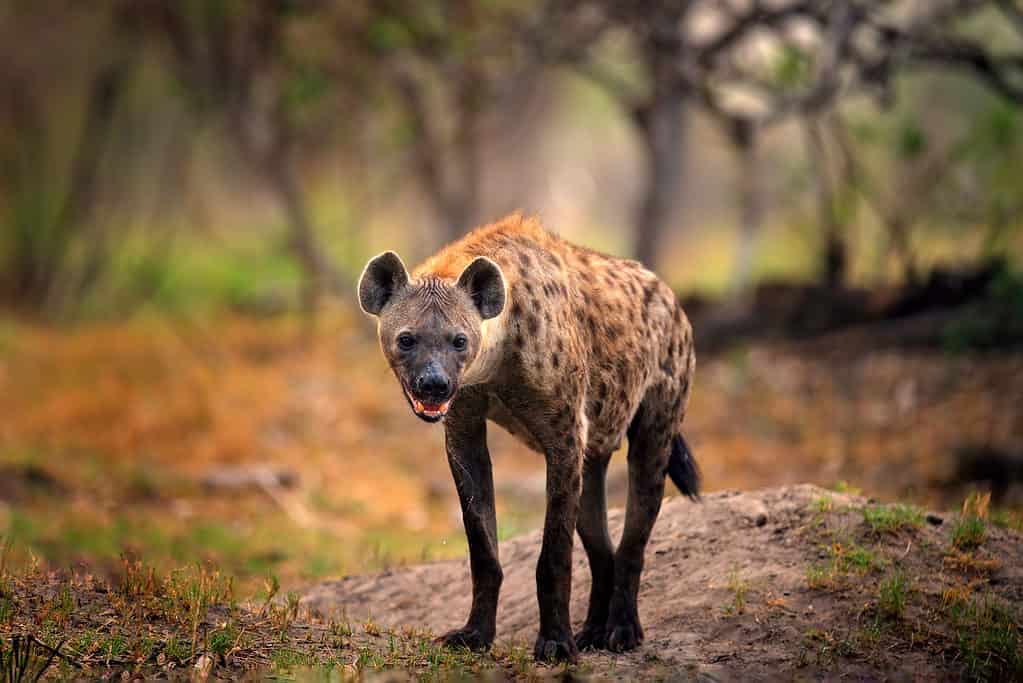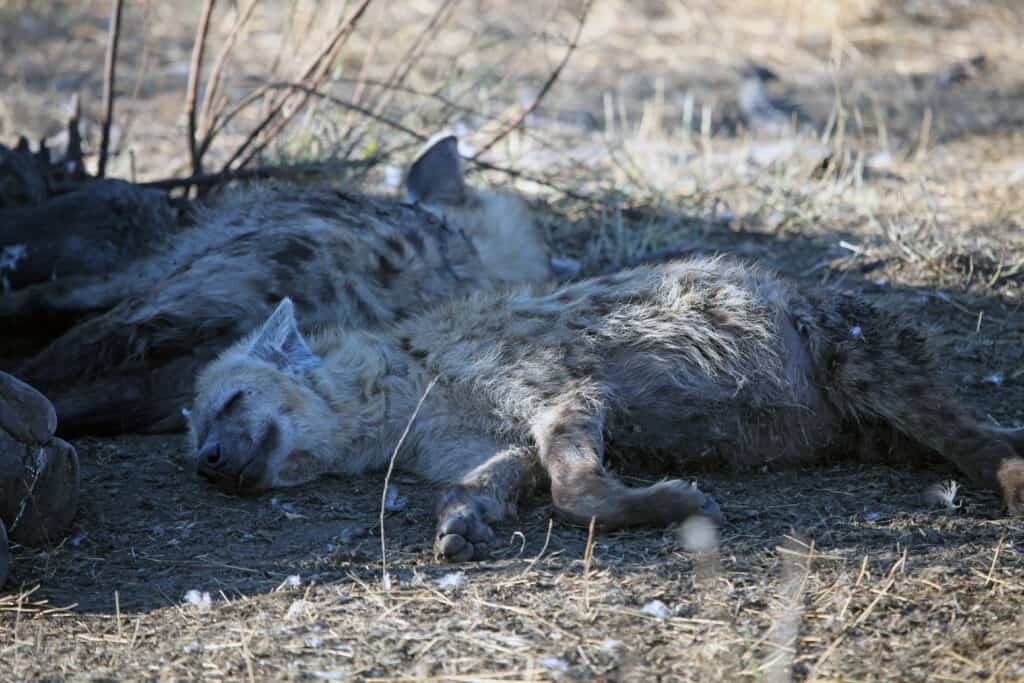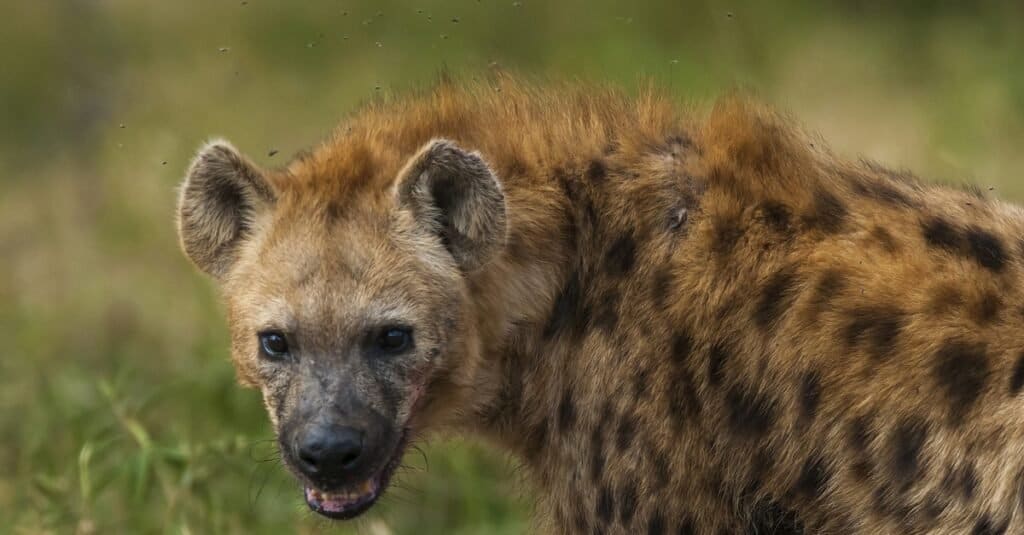We’ve all heard the saying “Laughter is the best medicine.” But did you know that hyenas have their own unique way of laughing? That’s right – hyenas actually laugh! In Disney’s 1994 animated film “The Lion King,” the hyenas are depicted as a group of villains who ally with the main antagonist Scar. They are widely remembered for their boisterous personalities and wacky laughing. So, is that really how a hyena laughs? Let’s find out!
What Is A Hyena?

Hyenas are primarily scavengers and often steal food.
©Ondrej Prosicky/Shutterstock.com
Hyenas are carnivorous mammals found in Africa and parts of Asia. They are known for their distinctive appearance, which includes a thickset body, powerful jaws, and a shaggy mane. Hyenas are noted for their intelligence and complex social structures, which are dominated by a matriarchal hierarchy.
The spotted hyena, brown hyena, striped hyena, and aardwolf are the four different species of hyenas. Although the spotted hyena is the biggest species and a competent hunter, it is also renowned for scavenging other predators’ dead bodies. In their ecosystem, hyenas are significant scavengers and predators.
What Does A Hyenas Laugh Sound Like?

Hyenas eat the entire animal including bones.
©Jez Bennett/Shutterstock.com
Hyena laughter is a bit different from our own human laughter. Instead of a series of “ha ha ha” sounds, they make something called “whooping vocalizations.” It may even sound menacing to some people, but it’s really just another form of communication for these animals!
A hyena’s laugh sounds like a series of loud, high-pitched whoops, cackles, and groans that can be heard from a distance. This type of sound is often described as more like an intense cackle or chuckle than an actual laugh.
These chirps can range from soft and subtle purrs to loud yelps depending on the situation at hand. In addition, young cubs may emit high-pitched squeaks while playing with each other or during social interactions between adults and cubs alike!
How Does A Hyena Laugh?
The hyena’s “laugh” is a distinctive vocalization and is produced by the hyena’s enlarged larynx. It is produced through a series of short, staccato-like grunts and giggles that are often repeated several times. The most common type of call used by hyenas is “whooping” which consists of short bursts followed by long drawn-out calls that sometimes resemble human laughter.
Why Do Hyenas Laugh?

When food or danger is present, hyenas laugh to warn other hyenas.
©Judith Andrews/Shutterstock.com
While the sound is commonly referred to as a “laugh,” it is not a sign of amusement or happiness, but rather a form of vocalization used to convey social information. A Hyenas laugh helps to alert other hyenas to the presence of food or danger. Hyenas also laugh during social interactions, such as greeting one another or establishing dominance within a group.
In addition to being used for communication between group members, hyena whoops are also thought to serve as warning signals and territorial markers. They are most often heard when two groups come into contact with each other. Hyenas also produce chirping noises when greeting one another or showing submission toward higher-ranking members within their pack, particularly during social interactions such as feeding and mating.
Do Any Other Animals Sound Like Hyenas?
While the hyena’s laugh is unique, there are other animals that make sounds that are similar in tone or rhythm. For example, the sound of a laughing kookaburra, which is a bird native to Australia, has been likened to the sound of a human laughing, although it is not as high-pitched as the hyena’s laugh.
Additionally, some primates such as chimpanzees and gorillas have been observed to make vocalizations that could be described as laughter in certain contexts. However, the hyena’s laugh is still considered to be a unique and distinctive vocalization.
How Far Does A Hyena Laugh Travel?

Hyenas are social creatures and communicate often with each other.
©Foto 4440/Shutterstock.com
The sound of a hyena’s laugh can travel over long distances, as it is a loud and distinctive vocalization that can be heard up to 3 miles (5 kilometers) away in some cases. This makes it an effective way for hyenas to communicate with one another and to establish their presence to potential prey or predators in their territory. However, the distance a hyena’s laugh can travel can vary depending on factors such as the terrain, weather conditions, and the individual hyena’s vocal ability.
When And Where Can You Hear A Hyena Laugh?
Hyenas are found in various parts of Africa and some parts of Asia. In the wild, you would likely hear hyenas at night when they are most active. When visiting zoos or wildlife reserves, you may also be able to hear hyenas during the day, especially during their feeding times.
In Conclusion
Hyena laughter might not be quite what we humans would consider funny, but it definitely serves its purpose in the animal kingdom—and that alone should give us reason enough to appreciate these fascinating creatures even more! So, next time you come across some wild hyenas take note – not only will you get an amazing view into nature but also an interesting glimpse into animal communication through its unique form of laughing!
The photo featured at the top of this post is © iStock.com/mlschach
Thank you for reading! Have some feedback for us? Contact the AZ Animals editorial team.







